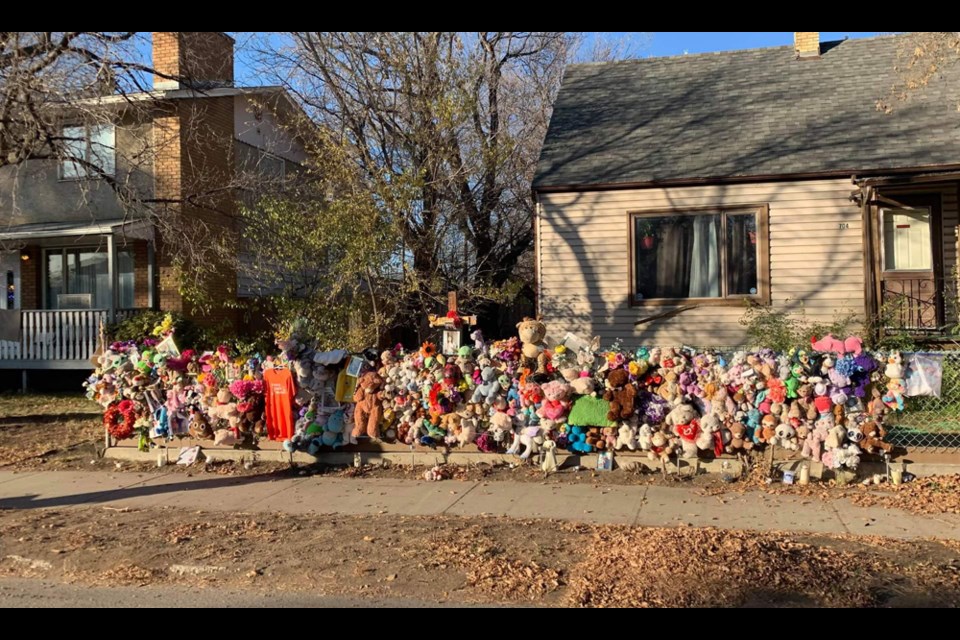SASKATOON — The issue of speed limits in Saskatoon has became a topic of discussion after the tragic death of nine-year-old Baeleigh Emily Maurice on the morning of Sept. 9 in the 600 block of 33rd Street West. She was hit by a vehicle while riding her scooter on her way to Mayfair Community School.
The city of Saskatoon has more than 100 schools and school zones — public, Catholic and private — attended by more than 40,000 students. And every year from September to June, for nine hours (8 a.m. to 5 p.m.) during weekdays certain traffic restrictions must be followed.
The Saskatoon Police Service, on its Twitter account, assigns traffic officers every month to specific zones to catch violators and to keep everyone safe — from buses and cars dropping off children, school staff helping direct traffic, parents who walk their kids and students who ride their bikes and scooters to schools.
“Recently we’ve had some inquiries about school zone enforcement. Traffic safety is a priority for the SPS … Do your part and obey traffic and parking signs around schools before it ends up in a fine,” the SPS said on Twitter.
School Resource Officers of the SPS Traffic Unit last September went to Sylvia Fedoruk School and Alvin Buckwood School teaching parents that "No Left Turn" means just that and to educate parents on navigating school zones safely when dropping off their kids.
Officers who are responsible in these zones, as stated on the SPS Twitter account, also rotate schools the following month. And in a one-month span, from Sept. 1 to Oct. 25, or 36 school days, police had already issued a total of 354 tickets in Saskatoon school zones, an average of 9.8 tickets per day.
That is why SPS is reminding motorists to follow traffic rules while in school zones, like slowing down to 30 km/h, obey parking signs and remembering U-turns are prohibited.
Student safety
Saskatoon Public Schools Communications and Marketing Manager Veronica Baker told SASKTODAY that keeping students safe is their top priority.
“Our school division works with the City of Saskatoon when there are traffic or safety issues that impact our schools. Our normal avenue for raising concerns would be through the city administration.
“We also work with the Saskatoon Police Service on school zone safety. School Resource Officers may present and educate students about school zone safety and best practises for staying safe when walking or biking to school. The Traffic Safety Unit will often be present to monitor activity in our school zones.”
The public-school division, on their website, has a Move To Grow campaign where they encourage students and their families to look into other ways of getting to and from schools like walking, cycling or using an active mode of transportation.
“At Saskatoon Public Schools, we teach our students to make positive choices that will support their health and well-being. As educators, we know that a daily opportunity to exercise can have a multitude of benefits for our students in the classroom. But additional opportunities to be active every day can bring improved wellness not only for our students, but also families and community,” as stated on the school division’s website.
The campaign also suggests parents should teach their kids safe walking and cycling tips, and work out a safe route when they walk or ride their bicycle to school. It is also encouraged to have their kids go to school with their friends or their neighbour, making sure they are also dressed properly based on the weather.
City’s recommendations
City council is also set to vote on recommendations made by the Standing Policy Committee on Transportation to keep schools and playground zones safe. Some of the recommendations are having year-round school zones and introducing playground zones with reduced speed limits. The council will debate and vote on the issue at its Nov. 29 meeting. If the recommendations pass, the changes will be implemented in 2022.
They include having new playground zones with a reduced speed limit of 30 km/h, a year-round lowering of speed limits both in school and playground zones seven days a week from 7 a.m. to 9 p.m., adjusting the posted signs and length of current school zones, and removing lower speed school zones from high schools by designating them as school areas where making U-turns is still not allowed.
While lowering the speed limit in areas with seniors is not recommended, having traffic calming measures and pedestrian crossing devices will still to be used for pedestrian safety at important crossings near these facilities.
The Committee on Transportation, during their meeting last September, voted down a proposal of lowering speed the limit from 50 to 40 km/h in residential areas. They did, however, approve a motion for a cost feasibility report for a neighbourhood speed watch program.
The city’s media relations department, in an email to SASKTODAY.ca, said the administration must report back to the committee on the costs, grant options and the feasibility of having a Speed Watch program, with a plan to adopt such a program or carry out a limited pilot project to help assess its worth.




